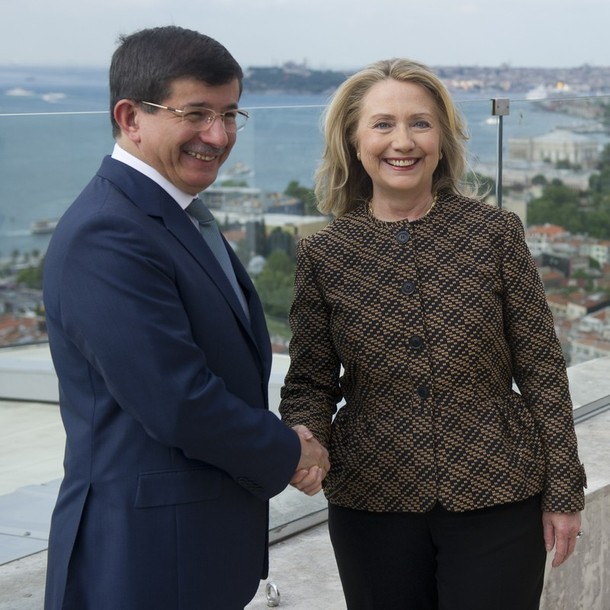Reminding us that in the days following 9/11 NATO invoked Article V of the Washington Treaty, an attack on one is an attack on all, she launches a review of U.S.-European relations since the end of World War II, through the Cold War, and including deteriorating relations during the George W. Bush administration.
Upon assuming the post of secretary of state, she recalls, she made phone calls to European leaders letting them know we remain tight friends. Her first opportunity to reinforce that message face-to-face came with her attendance at the April 2009 G-20 summit in London.
Playing Catch-up With Mme. Secretary 2: London
She formed an especially good working relationship with then UK Foreign Minister David Miliband, but allows that she also had a good rapport with then Shadow Foreign Minister, William Hague who now holds the post. She dubs Hague "the David Beckham of toasting."
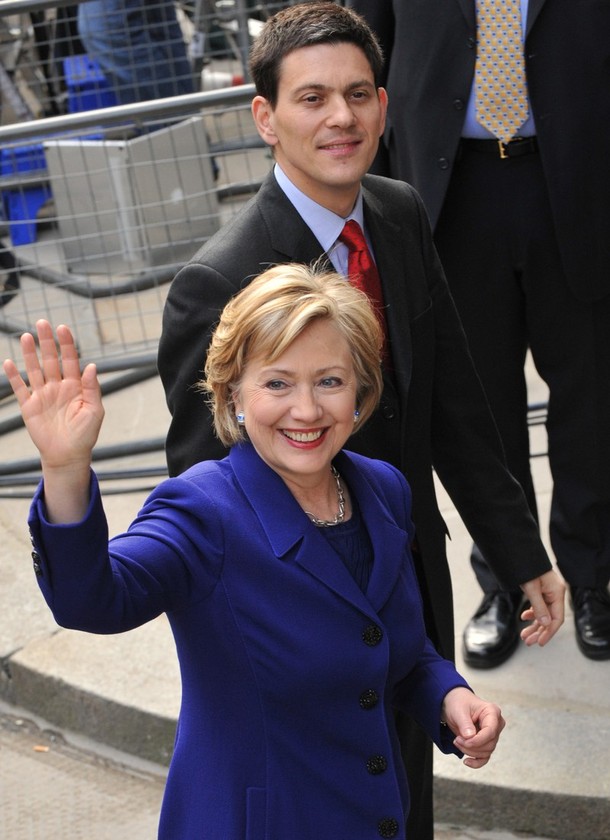
Playing Catch-up With Mme. Secretary 3: Germany, France, Czech Republic
If your eyes welled up at times when reading the previous chapter about Pakistan, Hillary evokes smiles and laughter with her description of Former French president, Nicholas Sarkozy. Revealing that often his interpreters had trouble keeping pace with him and that he asked her why all the other diplomats were unforgivably old, gray, and male, she revisits that simply charming "Cinderella" moment when she lost her shoe on the steps of the Élyseé Palace. (Posts here are not necessarily deep and analytical - as you may know.)
Hillary Clinton Loses Her Shoe And Looks Adorable Doing It!



She speaks of her strong admiration for German Chancellor Angela Merkel with whom she apparently shares a "color memo" phenomenon so uncanny that on a state visit in June 2011 Angela brought her a framed German front page where readers were challenged to guess which was which sans benefit of visible heads.
Slideshow: Hillary Clinton at Chancellor Angela Merkel’s State Visit Today
Video: Secretary Clinton at the State Luncheon in honor of German Chancellor Angela Merkel
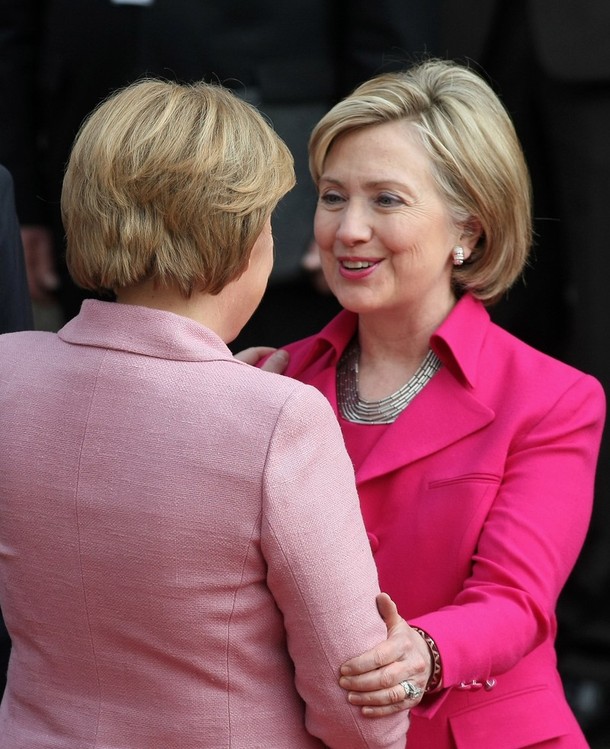




Hillary provides a pretty extensive retrospective on NATO, its post Cold War expansion in eastern Europe, and its contributions to operations in Afghanistan and in Libya. She is very passionate on the subject of NATO calling it one the most successful military alliances in history (and the European Union one of the most successful political ones). She contrasts 75% of the sorties over Libya striking 90% of the targets with the situation a decade before when the U.S. was responsible for hitting 90% of targets in Kosovo. Her attestations on pages 231 and 232 are presidential (to the surprise of no one here). A thing to behold.
Madeleine Albright was known for her brooch-diplomacy. Some of her foreign counterparts came to see her brooches as a mood-coding system. Hillary, who is, after all, a self-described hair icon, relates an amusing exchange when she was in Bulgaria (NATO member since 2004) in February 2012. Prime Minister Boyko Borissov seemed edgy. He finally confessed that he had heard that when her hair was pulled back it indicated a bad mood. She reassured him that she was not engaging in hair diplomacy but that it "takes her a little longer" to get her look together.
Secretary Clinton with Bulgarian Prime Minister Boyko Borissov


Turkey has been in NATO since 1952, is strategically very important, but following the G.W. Bush administration the Turkish people took a dim view of the U.S. Hillary's first visit there as secretary of state was in March 2009. She made it a point on that trip to take advantage of mass media.
Hillary Clinton’s Interviews in Turkey
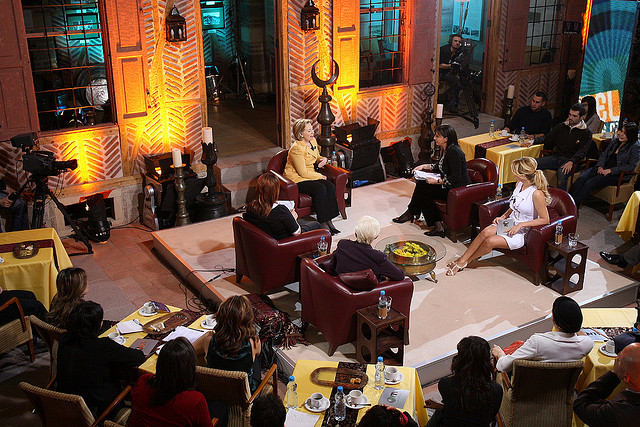
On pages 234-235 she explains the term Islamist Party. It is an important read. She discusses [now outgoing] Prime Minister Tayyip Erdogan at length and states her concerns regarding his "Zero Problems with Neighbors" policy, which, on first take, can appear very positive. Hillary cites the real and potential pitfalls of such a policy, especially when Iran is one of your neighbors. [Reports are that Erdogan will continue calling the shots, so it is unlikely that this policy will be abandoned.]
Ahmet Davutoglu came into the picture early as a close advisor to Erdogan but soon became the Turkish foreign minister with whom she collaborated over nearly her entire term. (Ali Babacan was the foreign minister she encountered on her first trip there.) Only three months after that trip, Davutoglu arrived at the State Department as foreign minister and a long working relationship commenced.
(As I returned to the first draft of this post to edit it, Davutoglu was named the new prime minister of Turkey. Congratulations, Mr. Prime Minister and the best of luck to you in your new post!)
Hillary Clinton’s Bilaterals Today
Hillary Hosts The Patriarch
Hillary Clinton Visits the Patriarchy in Istanbul


In chapter 9, we saw Hillary negotiate the re-opening of the supply lines from Pakistan into Afghanistan. She never makes a big deal of that, but it was a testament to her diplomatic skills. Without those lines open, important supplies could not get to the troops, and they were closed for many months.
Another of her major accomplishments was one which she was never intended to handle and which she describes blow-by-blow. She had traveled to Zurich simply to witness the signing of the Turkey-Armenia Accord. It was to be a quick stop on the way to London. A formality. At the last minute Armenian Foreign Minister Nalbandian balked about a speech Davutoglu was planning to make. Hillary took it upon herself to fetch him and, using two cell phones, negotiate an agreement for the parties to go ahead with the signing. She operated mostly in her SUV. It was a very dramatic day. She saved it, and at the event stepped aside for her Swiss counterpart, Foreign Minister Micheline Calmy-Rey, who was the host, to orchestrate the formalities. I remember her giving Micheline a little wink of encouragement. In typical Hillary fashion, she did not care to boast or take credit for this. She only cared that the work got done.
OK! Now it is a done deal! Hillary helped negotiate the agreement
Turkey-Armenia Accord Salvaged and Signed – Hillary Helps Make History!
Video: Signing of the Armenia Turkey Protocols
How Hillary Saved The Day




She departed for the trip to the Balkans that she speaks of on the day of her wedding anniversary 2010.
The Balkans: A Family Affair
Hillary Clinton’s Town Hall at National Theater Sarajevo

And then there was Kosovo where there was a huge reception in Pristina. She stood beneath the enormous statue of Bill Clinton, and then discovered a store named for her (so Bill wouldn't be lonely).
Hillary in Clinton Country (Kosovo, That Is!)




No matter where she traveled as secretary of state, Hillary always made sure to hold a meet-and-greet at the embassy or consulate that had hosted her to thank them for all of the work they had done to make her visit go smoothly. As it happened, her final stop as secretary of state was especially significant because it was at the Consulate General of Belfast. Peace in Northern Ireland had been a high priority of the Clinton administration and hard work on both sides of the Atlantic and both sides of the Irish Sea had brought that troubled land closer to that goal than it ever had been before.
Video: Hillary Clinton with Peter Robinson and Martin McGuinness
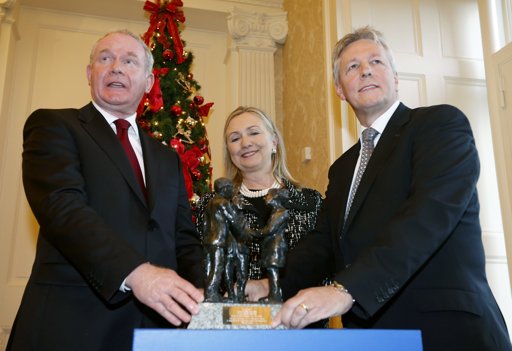
Hillary Clinton at The Ireland Funds Luncheon
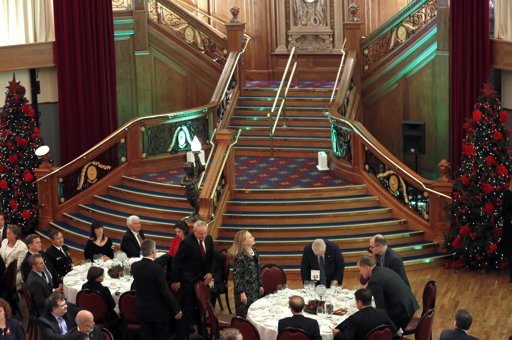
Hillary Clinton with Staff and Families of Consulate General Belfast
Happy St. Patrick’s Day!
Hillary Clinton’s Statement of Northern Ireland Decommissioning
Address of Secretary Clinton to Full Session of the Northern Ireland Assembly





The passages I bolded in the background briefing [in the link below] reflect, I think, what is so typical of the Hillary Clinton so many of us know and love, the Hillary who works tirelessly in the background and declines credit for the good she does. I am very certain that her intervention was integral in attaining this latest ascension up the tall ladder of unity in Northern Ireland. But Hillary Clinton will always deflect the praise and aim the limelight on others with whom she has labored to reach an accord. That is simply who she is and how she operates. It is also very much a quality of character so many of us accept and admire about her. I, for one, am very mindful of the role she has long been playing in this peace process. I know the devolution will succeed, and there will be a final and lasting peace. When it does, I and many, will forever remember the key role she played in the process, even as she disclaims it.
Secretary Clinton on Northern Ireland

This European chapter has been somewhat active re: updates prior to publication. In the latest news, may this peacemaker rest in peace.
Former Ireland prime minister Reynolds dies aged 81
Statement by President Clinton on the Passing of Albert Reynolds
Statement August 21, 2014I am saddened by the passing of former Prime Minister of Ireland Albert Reynolds, who worked hard and risked much as Taoiseach to advance the Northern Ireland peace process. His leadership alongside British Prime Minister John Major was instrumental in laying the foundation for the Good Friday Agreement, and our world owes him a profound debt of gratitude. I will always be grateful for his encouragement, advice, and support in the peace process. I join with his wife, Kathleen, his children, his many friends, and the people of Ireland in mourning his loss.
____________________________________________________________



